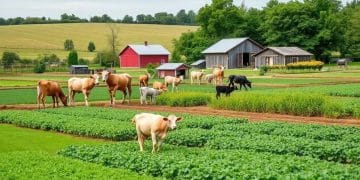Sustainable bakery gains national recognition for innovation

Anúncios
Sustainable bakeries gain national recognition by employing eco-friendly practices, using local sourcing, and offering innovative recipes that appeal to environmentally conscious consumers.
Sustainable bakery gains national recognition for its eco-friendly practices, proving that delicious treats can also be kind to the planet. Curious about how they achieved this? Let’s dive in and explore their journey, innovative recipes, and the impact on the community.
Anúncios
The rise of sustainable baking practices
The rise of sustainable baking practices has transformed the way bakeries operate. Today, more bakers recognize the importance of eco-friendly methods, not just for their business, but for the planet.
With a growing awareness of environmental issues, sustainable baking embraces practices that reduce waste and use local ingredients. Bakeries now strive to create treats that are not only delicious but also kind to the earth.
Anúncios
Key elements of sustainable baking
Many bakeries incorporate specific elements to maintain sustainability. These practices include:
- Utilizing organic flour and ingredients
- Implementing composting systems for waste
- Partnering with local farmers to source fresh products
- Reducing energy consumption through energy-efficient appliances
Furthermore, the community plays a significant role in this shift. Local events and farmer’s markets create opportunities for bakeries to connect directly with customers while sourcing ingredients nearby.
As these bakeries gain recognition, they inspire both consumers and other businesses to adopt similar sustainable practices. The impact extends beyond the bakery itself, influencing wider trends in the food industry.
Benefits of adopting sustainable practices
By choosing sustainable methods, bakeries not only contribute to a healthier planet but also benefit their businesses. Some advantages include:
- Enhanced brand loyalty from eco-conscious customers
- Reduction in costs through efficient energy use
- Improved product quality with fresh, local ingredients
Indeed, the rise of sustainable baking practices showcases how small changes can make a big difference. Each loaf of bread or pastry represents commitment and responsibility towards our environment.
How local sourcing strengthens community ties

How local sourcing strengthens community ties is a vital aspect of sustainable bakeries. By sourcing ingredients locally, bakeries not only enhance their products but also forge strong connections within their communities.
When bakeries buy from local farmers and suppliers, they support the local economy. This practice fosters a sense of community ownership and ensures that the money spent circulates within the area, benefiting everyone.
The benefits of local sourcing
There are several key advantages to sourcing locally:
- Freshness: Ingredients harvested and delivered nearby maintain higher quality and taste.
- Reduced carbon footprint: Transporting goods over shorter distances minimizes emissions.
- Seasonal offerings: Local sourcing encourages the use of seasonal ingredients, leading to unique and fresh menu options.
Additionally, local sourcing deepens the relationship between bakers and customers. When customers know exactly where their food comes from, it builds trust. They appreciate the stories behind the ingredients and develop loyalty to the bakery.
Local farmers also benefit from this arrangement. As bakeries purchase their produce, farmers receive support and gain visibility for their products. This strong network makes the local food system more resilient.
Building relationships through community engagement
Engaging with the community goes beyond sourcing ingredients. Bakeries often participate in local events and farmers’ markets. This interaction allows bakers to share their passion for sustainability and educate customers about their practices.
Through classes, workshops, or open houses, bakeries can showcase how they incorporate local ingredients into their products. These initiatives not only promote the bakery but also strengthen community ties, highlighting a shared commitment to sustainability.
Innovative recipes that highlight sustainability
Innovative recipes that highlight sustainability are becoming a hallmark of modern bakeries. These recipes not only tantalize taste buds but also showcase a commitment to the environment.
By using seasonal ingredients and sustainable practices, bakers can create unique dishes that reflect their dedication to eco-friendly methods. Each recipe tells a story of connection to the land and the community.
Key characteristics of sustainable recipes
Sustainable recipes often include:
- Locally sourced ingredients: Using produce from nearby farms reduces transportation emissions.
- Minimized waste: Bakers can creatively use leftover ingredients, like turning stale bread into bread pudding.
- Organic materials: Choosing organic flour and sugar contributes to healthier products.
A great example is a fresh vegetable focaccia. This recipe allows bakers to incorporate vibrant seasonal veggies from local farms. Topped with herbs and a drizzle of olive oil, it embodies the essence of sustainable baking.
Another innovative dish is the fruit galette. This free-form tart can be filled with any seasonal fruit, making it flexible and delightful. The use of whole grain flour can enhance its flavor while promoting health through better ingredients.
How to create your own sustainable recipes
Bakers can start by exploring farmers’ markets to find fresh, local ingredients. This not only inspires creativity but also ensures the quality of the food. Experimenting with flavors can lead to new and exciting combinations.
Sourcing ingredients that are in season not only adds freshness to the recipes but also supports local producers. Using leftovers in creative ways reduces waste and can lead to delicious surprises.
Future trends in eco-friendly bakeries

Future trends in eco-friendly bakeries are shaping the landscape of the baking industry as sustainability becomes a core focus. As more consumers value environmental responsibility, bakeries are adapting to meet these expectations.
One trend is the increased use of renewable energy sources. Many bakeries are installing solar panels to power their operations. This shift not only reduces energy costs but also helps minimize their carbon footprint.
The rise of plant-based ingredients
Plant-based foods are gaining popularity in all types of cuisine. Bakeries are incorporating more plant-based ingredients into their recipes. This movement encourages the use of alternatives to dairy and eggs, making baked goods accessible to a wider audience.
- Oat milk and almond milk as dairy substitutes
- Flaxseed or chia seeds for egg replacements
- Coconut oil instead of butter
Additionally, using whole grains and ancient grains like quinoa and spelt can elevate the nutritional value of baked goods while appealing to health-conscious consumers.
Sustainable packaging solutions
Another significant trend is the adoption of sustainable packaging. Eco-friendly materials help bakeries reduce waste. Biodegradable and compostable packaging options are becoming standard practice.
Customers are increasingly drawn to bakeries that prioritize sustainability in every aspect of their business, including packaging. This responsiveness to consumer preferences fosters loyalty and enhances brand image.
Furthermore, bakeries are experimenting with bulk options to decrease packaging waste. Encouraging customers to bring their own containers or use reusable bags can significantly cut down on landfill contributions.
FAQ – Frequently Asked Questions about Eco-Friendly Bakeries
What are eco-friendly bakeries?
Eco-friendly bakeries focus on sustainable practices, using local ingredients, reducing waste, and minimizing their carbon footprint.
How can local sourcing benefit my bakery?
Local sourcing supports nearby farmers, enhances ingredient freshness, and fosters a sense of community among customers.
What types of sustainable practices are used in bakeries?
Sustainable practices include using renewable energy, reducing packaging waste, and implementing composting systems.
Why are plant-based ingredients becoming popular in baking?
Plant-based ingredients cater to diverse dietary needs and promote healthier options while being kinder to the environment.






